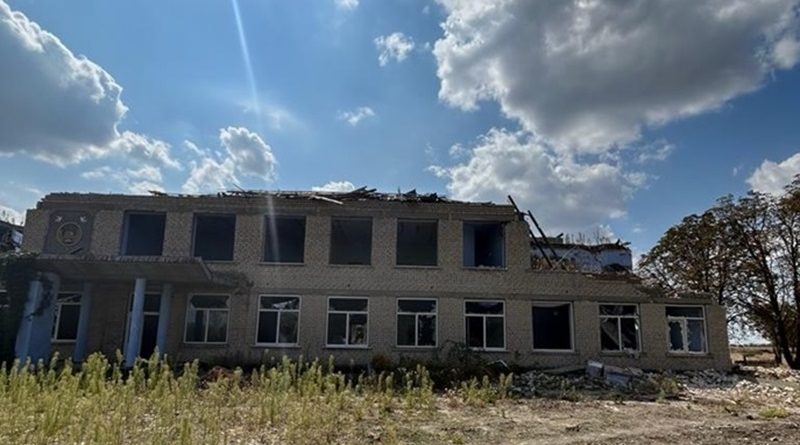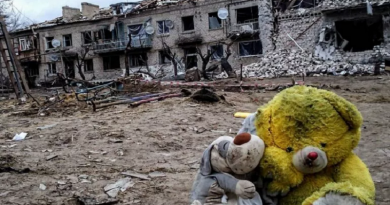Ukraine/Russia: Children’s futures under attack as Russian aggression in Ukraine continues to restrict schooling
Since the beginning of Russia’s invasion of Ukraine, those living under Russian occupation have risked brutal reprisals for seeking to continue Ukrainian education, with some parents choosing to hide their children to avoid them being taken to ‘re-education’ institutions, for adoption in Russia, or having them forcefully enrolled into schools operating under the Russian curriculum, new research by Amnesty International has found.
“Amnesty International has obtained evidence from 23 education workers and 16 families with school age children who were, or still are, living under Russian occupation, and documented how Russia’s war of aggression against Ukraine has led to significant and widespread interruption of education in Ukraine. In the Russian-occupied territories, intimidation and coercion are a daily reality for families, children and teaching staff. No one is safe under Russia’s endless campaign of terror in Ukraine” Anna Wright, researcher for Amnesty International, said of the findings.
Children endure schooling ‘in hiding’ to avoid reprisals
At the peak of their offensive Russian forces occupied around a quarter of Ukrainian territory, and continue to control around one-fifth today. Despite risks of reprisals, a few months into the occupation, some teachers and parents tried to organize schooling under the Ukrainian curriculum.
In the words of a regional education official, teachers, students and parents turned into “partisans digging holes in their gardens to hide laptops and mobile phones or hiding in the attics and old sheds to catch the mobile signal.”
A school librarian, Uliyana*, told Amnesty International that she had to secretly arrange meetings with students to give them books, despite Russian military patrols in the streets of their village who often conducted arbitrary searches.
Some parents chose to discontinue education for the sake of their child’s safety. Polina, a mother of two, shared that her children were outside of their house only a few times during nine months of Russian occupation, due to fear of them being taken to Russia.
Continued fear and intimidation for those living in occupied territories
Kseniya*, the mother of a 15-year-old boy, Kyrylo*, from an occupied village in Kherson region, told Amnesty International about a home visit from a teacher in spring 2022. The teacher asked Kyrylo whether he would attend the school when it reopens in September. Kseniya said that Kyrylo would not go to the school. At the beginning of September, men dressed in Russian military uniform came and told them: “In case you do not show up at the school tomorrow, the bus will come the following week and take you to an orphanage in Russia”. Kyrylo returned to school, only to find it had been decorated with Russian state symbols, while armed personnel were stationed at the door and inside the building.
A teacher from the occupied Berdiansk community in Zaporizhzhia region, who left the occupied territories in July 2022 but continues to give online classes to children still living in the occupied community, told Amnesty International how the children are now forced to learn and sing the Russian national anthem. Those refusing are threatened with being taken away from their parents for “re-education in Russian orphanages”.
At the same school, a notice, which was seen by Amnesty International researchers, was distributed to all students which said: “Look around you. You can see that Ukraine has destroyed Kharkov, Mariupol and other cities. If you do not want Ukraine to kill you, tell us everything you see and know about it.”
Indoctrination and coercion of teachers impacting the delivery of education
Hanna* and Olena*, both teachers from a community in Kharkiv region, which was occupied from March to September 2022, received texts from their respective schools’ headteachers trying to convince them to return for work and teach the Russian curriculum when they re-opened in September 2022. Both refused and went into hiding.
Olena had to abandon her apartment and lived with neighbours, while Hanna secretly stayed in her house, at the expense of not registering for any humanitarian assistance (packages of food) provided by the Russian occupational authorities. During her interview with Amnesty International she admitted that it was very difficult to survive eight months of occupation without any income and support.
Families’ testimonies from the Russian-occupied territories tell a story of schools that have reopened without sufficient or qualified teaching staff, with reports of children being left in classrooms on their own and told to read textbooks, meaning the quality of learning and discipline have suffered.
“The only way to help Ukraine heal and to make Ukrainian children’s present and future less painful, is for Russia to end the war in Ukraine, which is an act of aggression under international law,” said Anna Wright.
“In the meantime, the occupying authorities must immediately stop intimidating local people, coercing teaching staff into undertaking inappropriate educational activities, and other abusive practices. During war or occupation, all parties remain bound by international humanitarian and human rights law. Ensuring children’s right to access to quality education is one such duty, and it must be fully respected.”
Background
Amnesty International has been working to document war crimes and other violations of international humanitarian law since the beginning of Russia’s full-scale invasion of Ukraine. All of Amnesty International’s outputs published to date can be found here.
*Names changed for security reasons
The Ally of Executioners: Pushkin, Brodsky, and the Deep Roots of Russian Chauvinism
Is Russian Culture Responsible for “Putin’s war” in Ukraine?
Flirting with the Abyss: Russia’s Barbaric War and Crimes Against Humanity
Taking Pushkin off his pedestal
The “Victims of Tyranny” Narrative and the Silence about Russia’s War on Ukraine



